#tw; values dissonance
Explore tagged Tumblr posts
Note
Would old man Terry still smoke his signature Cuban cigars?
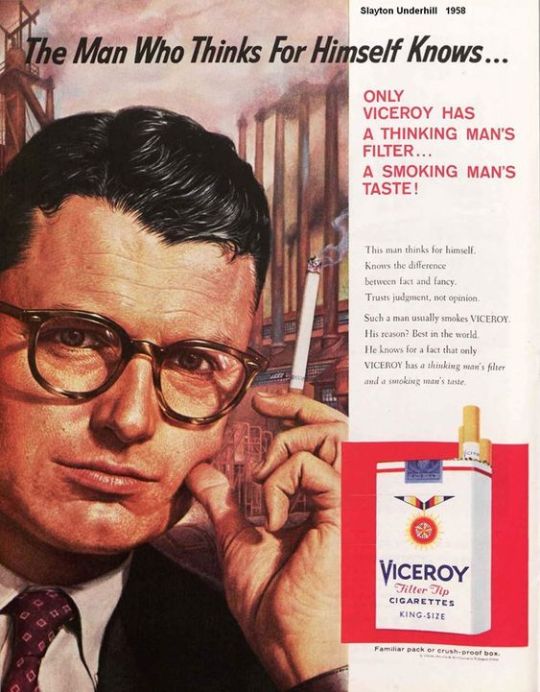
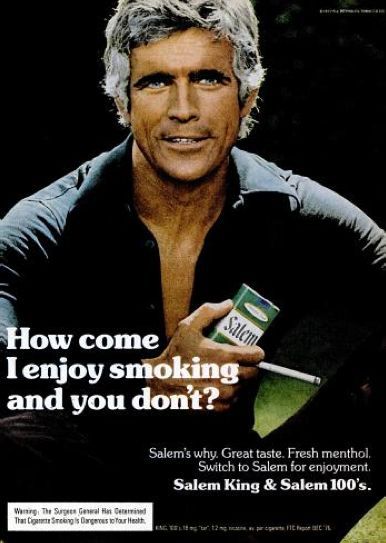
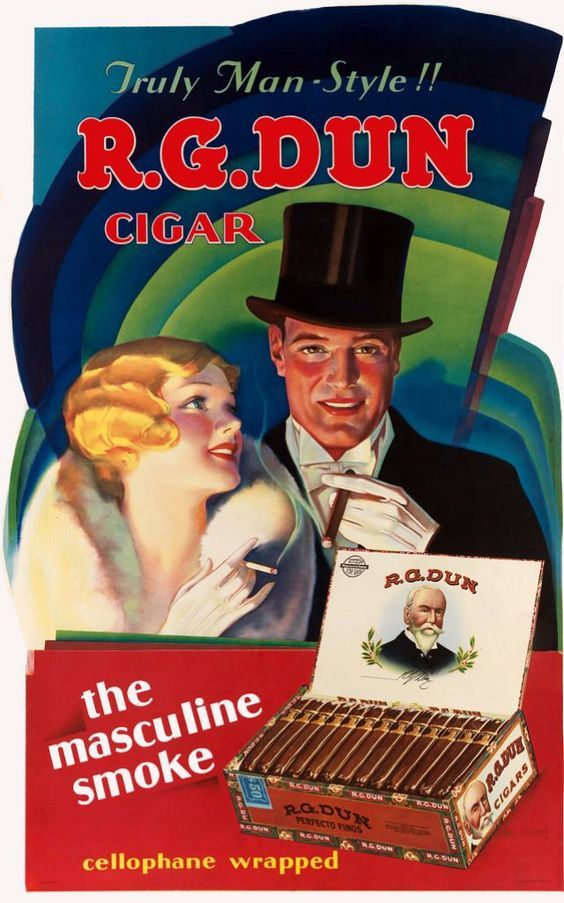
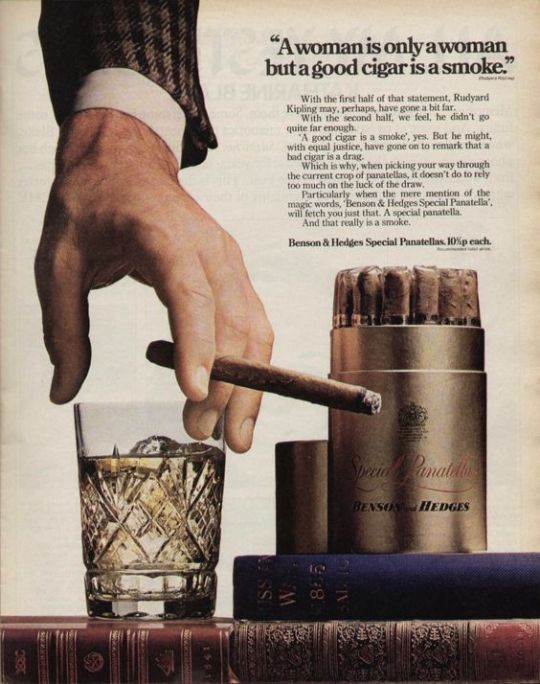
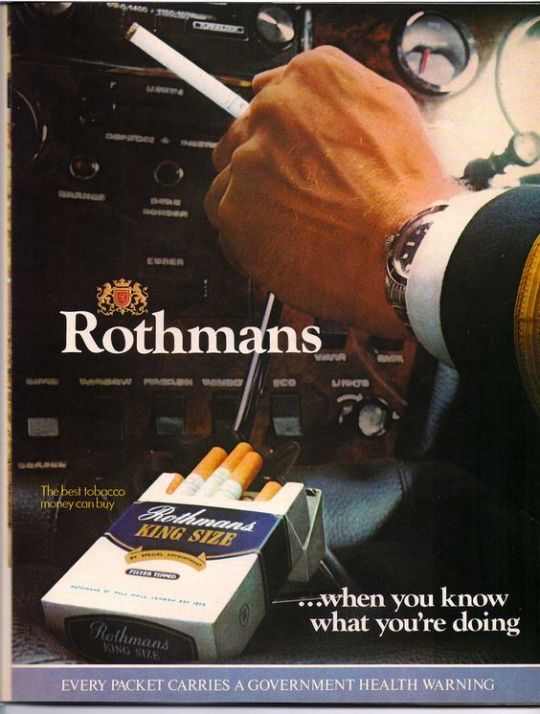
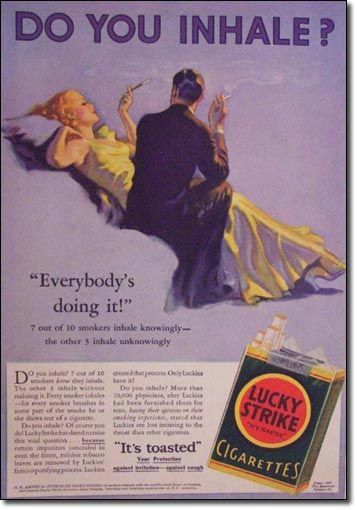
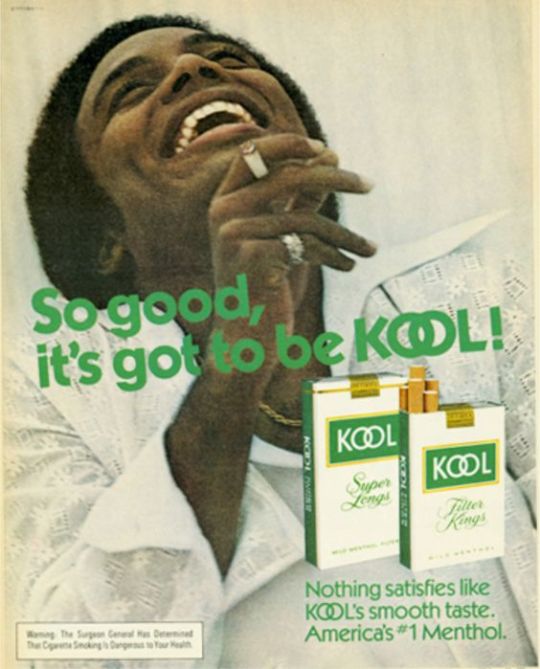
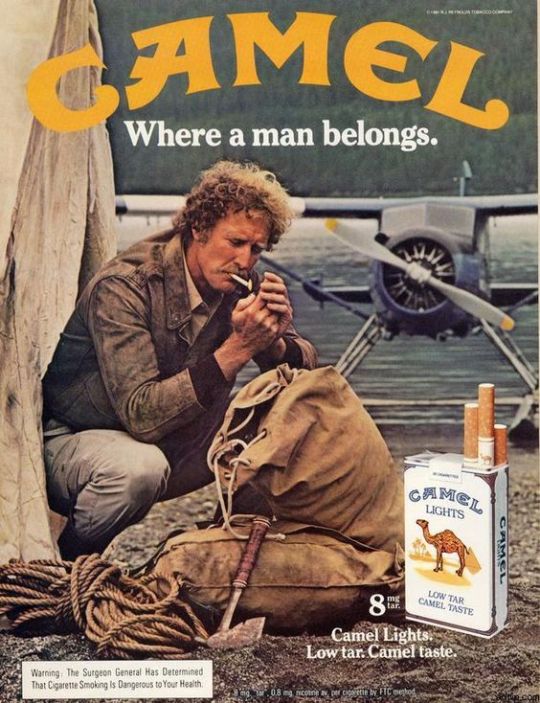
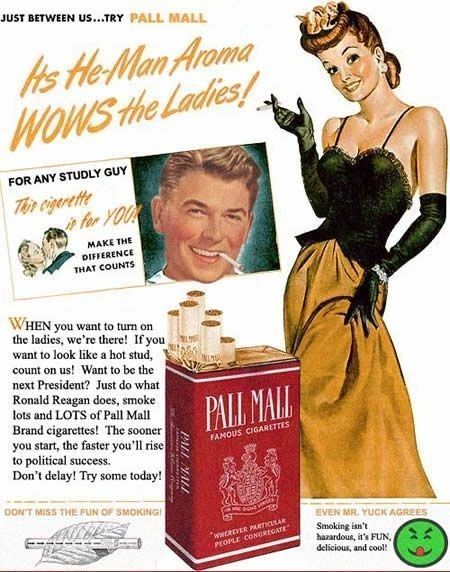
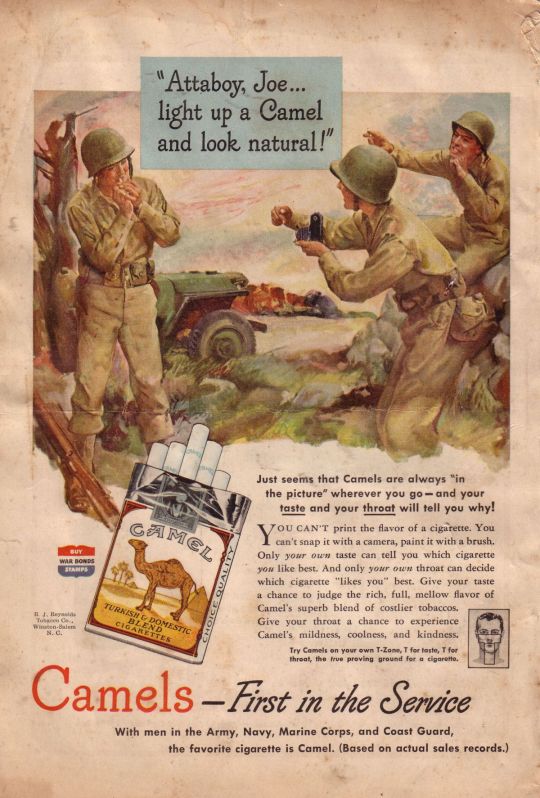
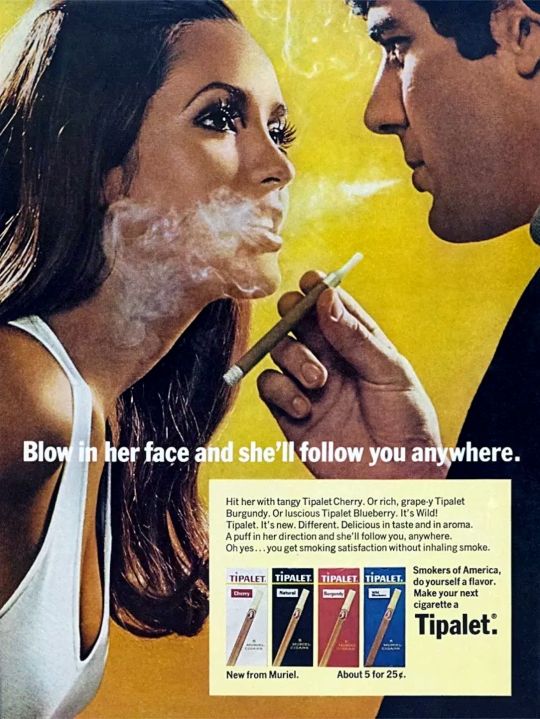
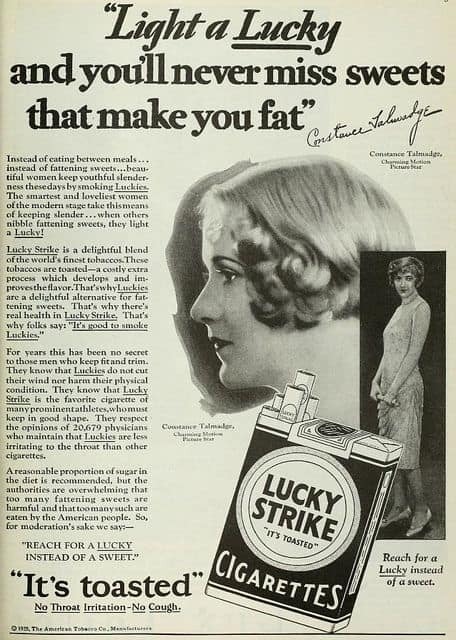
---
Why'd he stop?
Because it went out of fashion.
(See the above ads. Can you imagine anything similar today?)
In the 70's and the 80's, a Cuban cigar (or just a cigarette in general) would've been a sign of decadence and masculine power; it is what every Senator in his cabinet during his spare, private time alongside every coked out, upstart Yuppie on Wallstreet, every would-be Gangster Mafioso, every Banana Republic dictator and of course, Terry Silver, would smoke. Politicians, would perhaps, secretly indulge the vice, seeing as how Cuban cigars couldn't even be imported into the US up until a certain time, making them even more of exclusive of a habit. Just look at old advertisements. Men smoking in a manly fashion while, optionally, a nearby woman swoons and looks on. It's fun! It's sexy! It makes the ladies drop their panties, you men! You would be surprised how many plain, old Americana style scenes with Cowboys smoking I've found while researching a reply to this question. It meant something then that it doesn't mean now. Today, it is almost comically associated with the (quite literally cancerous) evils of Capitalism to the degree that if you asked a literal kid to draw you a corrupt rich man, they'd probably draw Monopoly man with a top hat and a cigar. Heck! Most public places don't even allow indoor smoking and you're relegated to a separate smoking area and still, people will stuck their noses up at you the entire time even so. What I mean to say is --- times changed and so did attitudes. So happens that Terry Silver lived long enough to witness these changes and I think he stopped smoking somewhere in between the fiasco that took place between him and John post tournament loss in 1985 and those thirty something years they weren't close. Long enough for cigars to go from a symbol of power to a symbol of something disgusting people collectively would rather not be around because it stinks and makes you sick. Gives you bad breath. And Cancer. It used to be cool. It used to be badass. Nowadays, it comes with a little message on the bottom of the box that says 'Smoking Kills!'
Terry Silver went through a (temporary) re-brand.
He changed the way cultural sensitives changed, as I keep on repeating.
Turned into the image of the ''acceptable'' type of the model rich man for the new, 21st century was meant to look and act like for a brief spell. Mellow. Clean cut. Vegan. Considerate and practicing 'mindfulness'. Someone very much in favor of attending therapy, seemingly sworn off of his formerly rotten ways, and in fact, completely tucking them away. A champagne Liberal fundraising apps for the poor from his multimillion dollar beach patio mansion. You see what I'm saying? Cigars --- they don't fit into that whole image, in fact, they completely clash with it. So, he discarded them, the same way he discarded many things that would come off as 'problematic' in the current day and age, shedding his skin and becoming a 'different' man to hide in plain sight, being the ultimate chameleon that he is, always adapting to his surroundings.
I do firmly believe he still has a stash of vintage cigars somewhere, in some golden or silver elaborate, decorative box he hasn't touched in actual decades, in some locked drawer or safe, as a keepsake. Perhaps he even lights up in his more mature age, for old time's sake, seeing it as a sign of authority, refusing to go down as some sad, old man once his existential crisis kicks in as the years advance and advance, taking the reigns of control and picking a poison of his own choosing to rot him from the inside, kicking up his legs on a work desk and smiling to himself.
Who knows?
Nobody's ever there to see him do it, just the way he would want it too.
#terry silver#kk3#cobra kai#tw; cigars#tw; tobacco#tw; values dissonance#cigarettes#tw; smoking#character analysis#cuban cigars
15 notes
·
View notes
Text
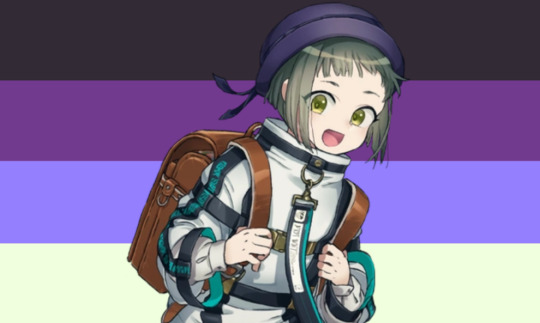
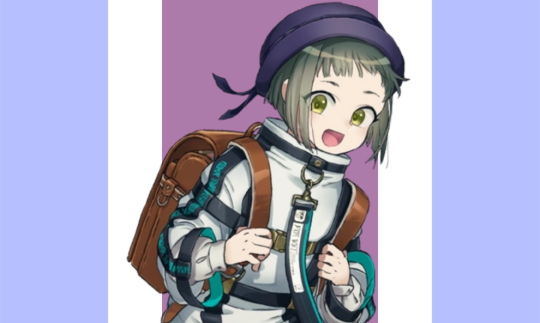
Amane Momose from MILGRAM, a music project by DECO*27 and Yamanaka Takuya-Polyfrag/C-DID (headcanon)
"[Not canon]
[ !!! TW for cult and child abuse mentions !!!]
Amane is a polyfragmented DID system. To Me. In her first trial (basically the first season if you want to think about it like that) she was voted Unforgiven/"Guilty" for the murder she committed. This caused her to, as many of the other characters describe it, "become a completely different person". In her second trial voice drama, she started referring to herself as "we", and she said that she was "both Amane Momose and not Amane Momose" when a character brought up her extremely out of character behavior.
Her voice was completely different when she talked and behaved like this. It was much emptier and deeper than her usual voice, which is higher and has an audible cadence to it, in stark contrast to the other voice's very monotonous tone.
In her second music video, The Purge March, it shows hundreds of Amanes together doing a march performance thing (idk I'm not familiar with marching band stuff). They all seem to be autonomous, having "gone rogue" and decided to do what they wanted nearing the end of the MV.
She is 12 years old and has been being raised in a cult. She's been severely psychologically and physically abused for who knows how long. Likely the vast majority of if not her whole life. As expected, she has a lot of cognitive dissonance going on. She both sees herself as completely free and as being controlled. She says she was treated well by her parents and then insults them for how they treated her. She values love and mercy above all else then seems to scoff at the idea of it.
I believe her to be polyfragmented because, well, the MV, and also I think it would explain why she could still be a system even despite the "evidence" a character used on her as proof that she couldn't be one. Her system may work in groups, so Amane could for most of the time always be "around" within a main fronting group, so to speak, even if she's not in control. The way in which MILGRAM measures if a prisoner is the prisoner or not (since it's their mind that is considered the prisoner, not necessarily the body) could still gauge that Amane is the one there if she's still co-fronting or co-con as other alters do their thing. This would keep the prisoner restrictions on her, which was what was used as proof that she was "just Amane" (ie. a singlet).
Last but definitely not least, she has a recurring "gag" in what are called MINIGRAMs. They're basically just silly little comics showing the prisoners day-to-day interactions with each other as well the the prison guard. This recurring gag is the "Amane Council". If she's being faced with a decision she needs to make but is heavily conflicted about it, it shows a council meeting being held in her head with 3 different Amanes debating on what to do.
Final verdict: She is a system.
Source(s): Dude trust me"
#Contender info#cdd swag bracket#polyfrag did#c-did#amane momose#cdd swag propaganda#milgram#tw cult#tw cult abuse#tw child abuse#< just to be safe
36 notes
·
View notes
Text
the scapegoat child [tw abuse]
A research paper in 2020 wrote that individuals living with narcissism create a “golden child” and one or more scapegoats within a household. This labeling gives people with NPD the freedom to:
manipulate or instigate
play people against each other, also referred to as triangulation
project their anger
continue living without regard to the impact of their words
displace all the blame onto someone else rather than be personally accountable for their own actions
In healthy family dynamics, the parent’s role is to support the child’s development and well-being. In dysfunctional families, child roles are artificial (for instance, the golden child or scapegoat child) and are meant to serve the needs of the parent.
8 Types of Scapegoating in Narcissistic Families
1. Caretaker
Scapegoated children may provide emotional and/or physical caretaking to one or more parent/stepparent, functioning as a stand-in best friend, spouse, therapist, or nurse. They may be given household responsibilities such as cleaning, cooking, and caring for siblings, while also being targeted with anger and blame for the family's woes. Often intuitive and empathetic, caretaker scapegoats can become powerful healers as adults. But if they continue to prioritize the needs of others over their own they are likely to experience anxiety, poor self-care, resentment, and burnout.
2. Problem-Solver
The problem-solver child steps up to handle things for the family. This child may take over in crisis situations, advise or make decisions for parents, manage aspects of the household, and perhaps earn money for the family. Problem-solver scapegoats may win short-term approval and/or a reprieve from criticism and drama by fixing problems, but, like caretakers, they are being exploited for the service they provide at the expense of their needs and healthy development. As adults, they often show capable leadership but struggle with feeling hypervigilant to potential threats, over-responsible for the well-being of others, and uncomfortable asking for help.
3. Protector
Children in the protector role step in to defend a parent and/or younger sibling(s) from the dominant narcissist's verbal and/or physical abuse. Such children may be driven to try to protect family members because of their own experience with being scapegoated, or they may become scapegoated in the family system as a result of standing up to the abuse. As adults, children who have confronted the aggression of abusers may become fierce and compassionate advocates for justice and the underprivileged. But they often struggle to recognize their own limits, vulnerability, and need for support.
4. Truth-Teller
Children who recognize and attempt to talk about family dysfunction (e.g., inequities, rage, neglect, boundary violations) are trying to resolve the cognitive dissonance between their experience of reality and the denials and distortions pushed by their gaslighting parent(s). Like protectors, truth-telling children in narcissistic homes may be motivated to question the family system because they are scapegoated, or they may be targeted with scapegoating because their awareness is viewed as a threat. Perceptive and often wise or even visionary, truth-tellers can be powerful social analysts, writers, fighters for justice, and whistleblowers. But seeing more than others do can also set them up for frustration, loneliness, and resentment from others who prefer to deny difficult truths.
5. Perfectionist/Achiever
Scapegoated children may attempt to win approval, avoid criticism, and disprove negative narratives about themselves through perfectionist patterns and high achievement. Such efforts can earn them passing validation or reprieves from negative attention, but typically very little the family scapegoat does is acknowledged or valued. Driven and often intelligent and talented, perfectionists/achievers may develop great capabilities, but they tend to struggle with a harsh inner critic, a need for control, and unrealistic standards for themselves and others.
6. Rebel
Family scapegoats may react to the unfairness of their role by adopting a pattern of ongoing rebellion against forms of control and authority in general. Unable to get their needs met or process their frustration in healthy ways, they compensate for feelings of powerlessness through defiant behavior. Like family truth-tellers, rebels are often driven by a desire for justice and can be powerful fighters for a cause. But they can be aimless and self-sabotaging unless they recognize the source of their anger and find constructive ways to focus their energy.
7. Collapsed
Some scapegoated children experience such harsh neglect and abuse, with few sources of support to build resiliency, that they fail to thrive and become mentally unstable, chronically ill, suicidal, institutionalized, homeless, consumed by addiction, and/or incarcerated. As adults, they may experience a trajectory of low functioning, repeated crises, or collapse that ends tragically in early death by illness, addiction, suicide, or violence. Kids who are "different" in some way, such as queer or neuro-atypical, are often targets of extreme scapegoating, both within their family and society at large.
8. Covert Narcissist
Of the child roles in the narcissistic family, the entitled and enmeshed golden child is probably most likely to develop a narcissistic personality. However, being scapegoated can also lead to narcissism, particularly the covert form. Scapegoated children who become narcissistic have typically been trained to submit to the dominance of a more overtly narcissistic parent (and perhaps sibling) and as a result learn to cloak their rage, superiority, and desire for control into passive aggression. In adulthood, scapegoated covert narcissists often identify as victims and may use that to garner sympathy while also subjecting others to the neglect and abuse they experienced growing up.
8 Signs That You’re the Family Scapegoat
There are usually specific signs and patterns that scapegoating will follow. The ones listed below may seem familiar to you, or you may have experienced variations on the theme.
1. You get blamed for everything that goes wrong.
If a bill wasn’t paid on time, then it was because you distracted someone while they were trying to do it. If something goes bad in the fridge, it’s because you don’t cook enough.
Some narcissist mothers even blame their children for their own natural aging process (i.e. if their offspring hadn’t been born, they’d still be in their prime).
2. Your abuser projects their own behaviors onto you.
They might scream at you, and then get upset with you for “raising your voice.” Or they’ll do something completely self-absorbed, but berate you for being selfish.
The abuser could be cramming fistfuls of mayonnaise into their mouth, but call you a glutton in between swallows.
3. The verbal abuse never stops.
If you dare to sit down for a moment after doing several hours’ worth of chores, then you’re lazy and useless. You only got a 95% on your test instead of 100%? Then you’re stupid too.
4. Your successes and achievements are downplayed.
You may be mocked for achieving something, or your successes may not be acknowledged at all.
The abuser(s) may even purposely undermine or sabotage your success, and then turn it around on you. For example, they might have missed your college graduation ceremony, and then insisted it was your fault for not telling them the right date/time.
5. The abuse is ignored by others.
After all, if you’re the one being abused, then they’re safe for the time being. Some might even join in during bullying sessions to try to endear themselves to your tormentor.
6. The abuse might go beyond the family.
Your abuser may encourage friends of the family etc. to pick on you as well. They’ll tell them lies about you, mock you in front of them, and make it seem absolutely okay for everyone to join in and torment you.
And if you try to defend yourself, then you’re obviously just being oversensitive and dramatic.
7. You often play the role of savior.
Regardless of how much you’re abused, you’re also inevitably the one everyone goes crying to whenever there’s a crisis.
This is because you’re the most capable, and they know it. So they’ll beg for your help as needed, then turn around and treat you like crap again as soon as the crisis has passed.
8. The abuse manifests in your well-being.
Sadly, many people don’t even recognize that they’re a scapegoat for years. For them, this is the only type of family life they’ve ever known. They internalize the stress, end up with anxiety, depression and/or eating disorders, and just muddle through as best they can.
Others shut down emotionally so they can handle what they’re going through. They numb out and don’t feel much of anything. As you can imagine, this ends up causing problems for their own relationship dynamics as they get older.
#scapegoat#scapegoat child#scapegoat abuse#parents#neglect#golden child#tw abuse#narcissism#not all may have npd#stop villainising npd#abusive parents#abusive#child abuse#abuse
3 notes
·
View notes
Note
(last anon= me, was a bit anxious it might not go over well for some reason- off now bc changing the capitalization was a pain)
i agree on the human aus! love their flexibility, the sorta "yeah, may as well happen" you get clicking on something (with love) completely ridiculous. it's also so much fun to see what people do with crowley's eyes and his relationship to the glasses.
i'm very very early in planning this, but i want a&c to be as close to theirshow characterizations as i can possibly get them (book boys are amazing but i want the drama). i don't know that i'll do a very good job at justifying it with their backstories, but i'm gonna try. (idk. people have different opinions on personality being nature vs nurture. i can claim majority nature if it's more convenient)
i'm thinking here that crowley, personally, would have had to kill somebody or a couple somebodies, in an absolute (it at least appeared so, still does), life or death, them or him scenario (only his life saved). said somebody or somebodies would have attacked first, and out of desperation-- not totally their choice either. i'm assuming for the sake of the fic that he'd be able to do it at all, and then survive a couple decades after, so there's... something.
i just can't figure out exactly how he'd have coped with it, and whether he'd, later, think of it as justified, like how much guilt there would be. don't know what's even plausible.
my biggest problem is that framing him as 100% Good and Pure (and weirdly helpless?) like ppl do sometimes is literally my biggest fear writing this (huge mischaracterization in general). i don't want to go for the exact same indifference as in the show, for reasons you mentioned (and also that level of apathy would fuck up the entire rest of the fic), but not too far in the opposite direction, either.
tysm for the first response and considering a second, this seems a whole lot more solvable- and sorry if it's a lot to ask to go over all this (although your ability to hold a shit ton of information at once and then respond eloquently is impressive asf, looking at like every chain with LWA), i just drew a bit of a blank. also my bad if it's got a little heavy for your blog, just realized looking at the tags 😭
oh @aq-uatic you silly goose!!!✨ im absolutely fine with asks like that, please feel free to sling them my way anytime!!! ultimately tho, that's what the tw was for; just in case it was a bit heavy for someone else, but for me, personally? there's not a lot of themes that i feel uncomfortable discussing, almost all topics are welcome and i'll soon say if they aren't!!!💕
ooooh okay, so a self-defence angle!!! i think that that could be interesting to explore, because - well, you could take it from the perspective that crowley is initially very righteous in defending himself, rightly thinking that he deserved to protect himself, and the use of force was proportionate. he could initially come across as quite dispassionate and apathetic about it, "me vs. them? well of course it was going to be me!", and ultimately not want to address the whole concept of having committed murder because, on face value, it was justified. and maybe he privately doesn't want to examine it bc he's apprehensive about what he'd find?
but then as plot (and character) develops, turns out that because the whole thing was so fast, fuelled by adrenaline and the instinct to survive, crowley ends up... not being able to remember much of it? and as details start to come back, i think that's where the cognitive dissonance element would play - that he then has to reconcile himself as being someone who he feels is morally sound, 'would never harm another human being', a good person... but then is starting to remember his fear in the situation, confronting his own mortality, and what it says about him to be able to take another life with little thought other than his own self-preservation? as well as remember the specific physical details of what happened? the sounds, the smells? looks in the mirror afterwards and sees a different person looking back?
obviously without knowing the full motive of the person attacking him, who they are, what their story is etc.,... i think crowley could end up dealing with it in a way that he accepts that he cannot control others' actions, only his own. that that person chose to put him in the position of having to defend himself, and whilst, yes, that person may have had a family, friends, potential... when he's in a position of ensuring his own survival, he may have actually made the best decision he could have at the time. idk if you're planning to explore the attacker's circumstances in any depth, but if - for example - they were trying to rob him out of their own desperation (e.g. homelessness/austerity, fund addiction, peer pressured/gang context, mental health), maybe crowley would deal with that by exploring charitable work, or good causes, that seek to alleviate that very desperation? and that's how he heals from the experience?
again, hoping this might be some food for thought!!!✨💕 please do link me your fic when you've posted anything, i really admire how you're exploring this concept and it sounds really interesting and promising!!! i'll reiterate that i love getting asks, especially when they explore topics like this; i feel the LWA ones are a little bit of an anomaly, for being really analysis-heavy (which i love, let me clear), but getting to be a bit creative is exciting for me too!!!✨
4 notes
·
View notes
Text
A country founded by a bunch of drunk assholes wrecking private property (and worshipped by those who see their thoughts and deeds as immutable and sacred) do not understand why people would riot; beyond, of course, what they've openly concluded as self-destructive greed (half will say that it's because of indoctrination or ignorance because those speakers are incredibly stupid; the other half will say it is innate, born within the rioters because those speakers are incredibly racist).
I feel like there are some things that needed to be mentioned in order to temper one's perspective on history.
(tw: descriptions of violence as part of historical context, plus delivered in a really fuckin sarcastic tone about all of it because of fucking course we are going to repeat history that's just as much a part of humanity as infinite as our imagination)
I do not see riots, particularly the ones happening in Milwaukee, Wisconsin in the wake of George Floyd being slowly, publicly, and extrajudicially executed by a cop (who probably got trained by some bloodthirsty ghoul up the pecker order who went to Israel, if his murderer wasn't trained by the IDF himself) as failures on the part of the citizens but rather the absolute and utter failures of the local civil leadership (from the Floyd murderer's commanding officers, to the mayor and city council) on a multitude of ways. The most glaring and galling of these failures was in openly ignoring demands for justice when a known quantity and frequent bad actor decided qualified immunity would cover him like it did all the other times it covered him before; and the sumbitch pleading under his knee really deserved it for holding a fake (looking but entirely real) twenty dollar bill and being disrespectful when denying he had done any wrongdoing.
To whom much is given, much is required. The higher up the chain you are, the higher the standard you should be held to. And apparently used to be held to, if the propaganda I've been exposed to all my life held any basis in reality. Don't tolerate asshole leaders, don't tolerate lesser evil, don't tolerate *any* fucking evil. Examine your place in it and look for ways to mitigate it if that shit bothers you, don't shout down somebody else because they put you in cognitive dissonance, sort that shit out in your own fucking head.
Need help? Think of it this way: If it's something you wouldn't want to happen to you but you're okay with it to happening to somebody else (which would also include 'if it happens to them, it will prevent it from happening to me'), that is the literal textbook example of evil (with or without the 'coward' status effect).
The poor value their lives and the lives of those around them because it's all they have that has been of any real worth to them. The powerful don't value the lives of the poor as much as they value their property. There have been a number of times in history where the poor have shown their betters how much more disposable property can be: The multiple seccessio plebuses during the Roman Republic, the peasants' revolt in England, the French revolution... And that's the stuff off the top of my head from before the industrial age.
Does that mean I'm gonna join a riot myself? More than likely not, I don't look to start shit. Sometimes trauma makes you try to use every tool at your disposal before it gets to that point. I just think anybody seeing a potential storm on the horizon and feeling a change in their broken bones will feel a duty to warn everyone around them that their pattern recognition is kicking in again in ways certainly stronger than mere pareidolia. Never mind that apart from a couple of rare and infrequent exceptions, rural American riots historically have involved the kind of goings-on the song Strange Fruit was about, and motherfuck that abhorrent horseshit; the klan started in Central Tennessee, not East Tennessee tyvm.
Besides, my jive is more with stuff like the Battle of Athens (1946). That was some good, old-fashioned, motherfucking siege warfare with a textbook Hollywood plotline: GIs come home from WWII and found the local political machine running roughshod over their kin, GIs do things by the book (including putting a ticket of GIs for local offices) while the machine used the sheriff's dept to bully everybody around.
Election day comes, poll watchers for the GIs start getting arrested for undisclosed 'federal offenses' while the deputies seize three ballot boxes. GIs wired the governor and the U.S. A.G. for help on ensuring a fair count, and they go unanswered (surprise, surprise). GIs figure they got to do something, so they decide to arm up, mount up, and lay siege to the county jail to force an honest count and release the poll watchers before the state militia could mobilize and shut them down in the morning.
A lotta gunfire exchanges, and sometime around 3:30am and the third charge of dynamite against the jailhouse, the deputies surrendered. The machine was actually trying to rig the election but the true count had the GIs winning.
It's a cute story...
...but it's also a situation that could be almost the polar opposite of how things are today. The bad guys were unorganized beyond the chain of corruption that linked them all, the GIs used their military training. Compare that to today where the corruption enabled them to fund the paramilitary training. The GIs had the benefit of slower lines of communication. Any rebellion today would not. Most of the 'reforms' that have happened in elections have been more or less to speed up the certification process and make things more difficult at the voter's end. If it happens fast enough, you can still say the process is fair while also blocking any and all transparency to the voting process, right? (Liberals love the appearance of legitimacy more than they like actually being legitimate, but I have no standing on the topic as I have always admitted to being an absolute bastard.)
I would love to be wrong, and I always hope I am, but life experience has taught me more than other people's words have been able to counter.
#“isn't that 'pecking order?'” yes yes it is. that was intentional.#the mature light is switched on because kids on tumblr have enough shit to worry about in life without my contribution to it#history#politics#american politics#political commentary#unsolicited opinions#nobody blames a steam engine exploding when the engineer was too lazy to do their job#the american spirit has always been one of anti-authority not pro-bullying#east tn#moonshine#bluegrass music#and other things I'm homesick for rn#american history#fuck the man#mean people#would interpret the reverence paid to the boston tea party not for the actions undertook during them but the idea that they tried to blame#native american#peoples for doing it#historical perspective#whatever
1 note
·
View note
Text
:TW, just check tags for your own safety. 😘
I know this probably doesn’t matter to anyone else but I have to write it somewhere. Also this is going to be a ramble. But I have this repeating experience
I have been having this weird cognitive dissonance and frustration when reading fanfics lately and I think I finally figured out why
Basically I love writing styles. It’s a whole thing for me, studying how writing approach issues and how they use language. Especially the author notes they fascinate me
So I am reading my little fanfics and I start to feel uneasy. To be fair it’s ‘dead dove do not eat’ so I try to decide if that’s why. But the ‘dead dove do not eat’ is the reason I choose the fanfic. I am searching for suicidal ideation, bullying, body horror. Seeing characters feel or work through my lived experience or things worse is not good, it hurts, I often cry and pause with a stomach ache. But at the same time it’s euphoric
I seek it out for a reason
Yet some of them feel so warm and kind, like a hug, and others feel horrible and wretched like a waking nightmare. I chalked it up to writing style and the narration. Maybe the detail
But I started comparing one of my favorite works to one that greatly upset me and I abandoned the first four times I tried reading it (I had to finish it, it was like my life reflected back at me from my siblings perspective)
And I found they were basically the same in level of detail and descriptions. They had a very similar writing style. So it wasn’t style or language. So I was back to the drawing board.
I’ve realized it’s because of values. I think all values can boil down to if you think humans are bad or if they are good and if it’s inherent or taught
Now I have abandoned most of myself from my childhood. I was a self-centered, bossy monster (I still am, but at least I know it and try to fight it). But I have desperately fought to believe that people are inherently good
I have fought suicidal ideation for way too long to not try to hold onto it. I have read and talked to way too many people who said that their attempts at suicide weren’t worth it. Suicide never helped their situations and certainly never resolved the problems they were having. And my hero and mentor, the person I will never possibly measure up to values two things, god and logic
Now I have never believed in their god and if there is a god, they owe me a long conversation and several millennia of therapy. If god exists he owes me this universe and several more. So I can’t ever follow my mentor in their pure and full dedication to their lord
But the logic that they think originates from their god giving us brains and science. The logic they think comes from god. That is something that I can look and aspire towards. Logically being dead doesn’t help me, but also it doesn’t hinder me
We know nothing about being dead so I shouldn’t rush into it, it could be worse than living, but we know nothing about it, it could be better. For my mentor I have spent time learning that any reason to live is worth living for. My dog, my friend, my sister, any of the things that I adore. The things I would fight to protect are worth living for
Which all of that is irrelevant except for the fact that I think logically if there is no purpose to life, then no matter the little or large joys, there is no reason to continue fighting death. Why eat when I enjoy feeding the people I love. If I don’t eat I can feed them more?
But if there is a purpose to life I have to believe the connections I have to the things I enjoy is the key. Even ignoring connections to people the connection I have to my body and hobbies, that has to speak to the purpose of life. I hang onto a stuffed dog because it was the only comfort I had at the loneliest moment of my entire life. It sits in a place of prestige on my bed, I destuff and clean him before restuffing him with clean stuffing annually and fall asleep with him in my arms. To me, that connection has to speak to the purpose of life
I sincerely think that people are inherently neutrally good. It’s a naive good that you can twist. With justification young people believe that anything is good. I believe that lifes purpose is to love and to help others at every opportunity
I try to approach every situation with the belief that people mean well, that people are trying to be good even when I think they are bad. I try to remember black and white thinking is what traps us all
So I have been reading fanfics with hopeful optimism that the authors value themselves and other, that they also think people are inherently good. So when I read a story and the characters or underlying message is that people are horrible and cruel for fun. I feel ill and thrown off
I keep waiting and hoping the characters have an epiphany and see that people are always trying their best, even if their best is just survival. But a lot of fanfics and stories don’t agree with me. (There are also stories that focus heavily on one person being amazing and it irks me. I think of dnd campaigns, there is a party, there is very rarely if ever one character that is the focus and never makes mistakes)
Which I don’t think is wrong. I fully support these authors and their work. I actively support them and I hope they keep writing. Because if I want to sand by my idea that everyone is trying their best to be good. Then these authors are trying to be their best
Life is hard and for plenty of people thinking of people as inherently bad can be easier or make more sense and I get it. For a while I figured that even if people weren’t inherently bad, behaving as if they were and protecting myself from people saved me a lot of pain. Only with time did I eventually realize that I was hurting myself and others
As hard as vulnerability is, it is what love is built on
I think these authors are absolutely right to write and talk about ways to survive, I just need to better learn to recognize underlying values to help myself have a reason to avoid and dislike certain fanfics. Because it hurt me to dislike a piece of writing just because. If I don’t have a reason to put a story down, I can’t. I have to finish it.
#fandom#fanfic#dead dove do not eat#suicidal ideation#triggering content#ethics#ethics in fanfiction#rambles#religion
0 notes
Text
i wanna share the propaganda myself. dont know when its gonna be posted and i want it to be shared Now! i copied and pasted it to save it in case something happened and i lost it so. im just gonna paste it here (and make some revisions probably to take out some explanations of milgram because thats not needed and also to elaborate more on a thing or two)
okay ❤️ yay ❤️ /ref
!! TW for brief mentions of cults and child abuse
Amane is a polyfragmented DID system. To Me. In her first trial after being voted guilty, she had, as some of the other characters described it, "become a completely different person". In her T2 VD, she started referring to herself as "we", and she said that she was "both Amane Momose and not Amane Momose" when Es brought up her extremely out of character behavior and asked her if she was still Amane.
Her voice was completely different when she talked and behaved like this. It was much emptier and deeper than her usual voice, which is higher and has an audible cadence to it, in stark contrast to the other voice's very monotonous tone.
In The Purge March, it shows the hundreds of Amanes doing their march and performance. They all seem to be autonomous, having "gone rogue" and decided to do what they wanted nearing the end of the MV.
Having been raised in a cult, she's been severely psychologically and physically abused for who knows how long. Likely the vast majority of if not her whole life. As expected, she has a lot of cognitive dissonance going on. She both sees herself as completely free and as being controlled. She says she was treated well by her parents and then insults them for how they treated her. She values love and mercy above all else then seems to scoff at the idea of it.
I believe her to be polyfragmented because, well, the MV, and also I think it would be a way to explain why she could still be a system even despite the "evidence" Es used as proof that she couldn't be one. Her system may work in groups (a thing that I believe is pretty common in polyfragmented systems. I'm not polyfragmented, but I've heard this talked about as being a common thing from polyfragmented systems talking about their own experiences?? PLEASE CORRECT ME IF I'M WRONG </3), so Amane could for most of the time always be "around" within a main fronting group, so to speak, even if she's not in control. The way in which MILGRAM measures if a prisoner is the prisoner or not could still gauge that Amane is there if she's still co-fronting or co-con as other alters do their thing. This would keep the prisoner restrictions on her, which was what was used as proof that she was "just Amane" (ie. a singlet).
Last but definitely not least, the "Amane Council". I do not need to explain this here <3
sorry to the person running the CDD swag bracket for writing all of that about Amane. believe it or not that was as concise as I could possibly be about this--
11 notes
·
View notes
Note
happy birthday i am curious about your take on the dynamics in "our man bashir" since i can't stop thinking about it today. there's a spectrum of takes going from "garak coward" to "bashir terrifying and cruel, actually" which is a vast oversimplification but basically, there's so much in that episode about their moral stances and values and i think the reason its so important for the development of their relationship is that garak sees that sense of moral righteousness and commitment to duty that he considers to be the greatest good of all, and he REALLY did not expect that of julian when push came to shove. who was actually "right" or "wrong" or cowardly or not in that situation i think isn't the point, it's the fact that julian proves himself to garak. would love to know your thoughts thank u and have a lovely day
Oh, hard agree.
When it comes down to it, Garak is someone who feels very strongly about duty and obligation. His morals may be relative, but Daddy Tain broke his brain in a very specific way and broke it very well. If Garak knows how to do one thing, it's how to be loyal to an ideal and to be willing to do anything to uphold that ideal. Whether or not something is just and moral depends on how efficient the action is to uphold the ideal. He prizes utilitarianism above all else, to the point that the cognitive dissonance of it all and the tension between his desperately unprocessed grief about Tain and the Cardassia of his youth versus his loyalty to the Cardassian people literally causes a breakdown. Garak's relationship with Cardassia and with Tain (and Mila) is something that changes very subtly over the course of the show, and is directly and fundamentally tied to his identity.
Without Cardassia, who is he? Without Tain, who is he? Without Mila, who is he?
Garak both is and isn't a Cardassian alone. He's an exile, but still working for the benefit of the State and then later the People. He's a bastard, but for most of his life was the heir apparent as head of the Obsidian Order. He's no man's son, but he owes Tain his life out of filial duty. Tain won obligation and duty out of fear, not reciprocation. Garak loves his mother (whether Mila is his biological mother or not in alpha canon is a moot point to me, blood relation or not, Mila is his mother) and wishes to protect her and she wishes to protect him, and it causes them both to remain under Tain's power and control and in his service. He becomes a Starfleet asset and causes the death of Cardassians in the hopes of saving the heart and soul of his homeworld. He returns to Cardassia to see it through it's destruction. He survives the Dominion bombardment, but anyone who has ever loved him is dead.
And I think for much of the show, Garak and Julian have trouble seeing each other through the secrets they both must hold tight to their chests to keep themselves safe. (Yes, I know that the augmentations were a game time call, but I'm going with Death of the Author here.) They're both so preoccupied with fulfilling the roles they think they must in order to keep themselves and their families safe. Or rather, "safe." None of them are actually safe. And beyond that, Tain and Richard can go die in a fire. So while they accept each other and like each other and find joy and a measure of emotional security in their friendship and mind games and coy conversations, they don't quite see each other before "Our Man Bashir."
Because they don't really have the opportunity. Garak doesn't see Julian go toe-to-toe with Tain in "The Wire." Julian wasn't present for "Improbable Cause" and "The Die is Cast." Julian didn't hear Garak quote Shakespeare on the bridge of the Romulan warbird. Garak isn't on Starfleet away missions or in Julian's head in "Distant Voices" or "The Search." They remain tremendous influences on each other and integral parts of each other's emotional lives, but they don't see it. They underestimate each other, because who could possibly be as dark and twisted as they are? Who could be as fucked up and tormented? Because they don't talk about. They can't talk about. If they spoke about it, it would wrench away that thin, false veneer of security that's keeping them sane.
And we see it in "The Wire." Julian is so irate that Tain didn't have to ask Garak to put the wire in his head. That Tain had just manipulated and abused and positioned Garak into just accepting the modification. We know that Julian knows what it means to have a father who is an architect. Even though Julian doesn't clock that Garak is biologically Tain's son, he's been given the context that Garak is the Son of Tain. He has the threads of the story. He knows the emotional beats and the pain and the torment and the outcome even if he doesn't have access to the objective truth. But they don't talk about it. Garak's distraught enough that he's spoken about the emotional and physical pain that he's in. He'd rather be dead than seen as weak. He can't talk about it. He won't talk about it. And neither will Julian. Julian is also a decided master of not talking about it.
But that moment is the buy-in of trust.
"Our Man Bashir" is the pay off. Because Garak challenges Julian again and again and again, about his morals and his ideals and his sense of duty and his obligations but he doesn't see them. He isn't ever given an opportunity to really witness Julian's mettle. He isn't given the opportunity to see if it's just Federation propaganda and democratic doublethink taken root. There's no proof of concept of Julian's loyalties and promises to Garak that yes, Julian can be trusted and Julian can follow through and Julian can roll up his sleeves, get his hands dirty, and see the rough work done. There's no substantive proof for a man like Garak that this isn't just a game, an idle pastime, to Julian.
Julian, who holds all the real power and prestige and position in their relationship. Julian, who could have him turned out of the station. Julian, who might just be a fellow spy, even if he's an inept one. Julian, who might just turn out to be a useless dreamer who folds under the pressure of choice; might settle into the cold comfort of "no choice" when there is always, always a choice for men like Garak, who has always been forced to make it when others have been too weak or too squeamish or too scrupulous.
And then Julian shoots him in the neck to save his friends.
Julian shoots him in the neck, and says he'd rather die with his friends than to assure his own survival. That if he condemned his friends to death to ensure his own safety, it would be a betrayal to unconscionable to bear. Because Julian is honorable, and he is loyal, and he is idealistic.
And Garak realizes that they're both capable of the same things. He realizes Julian is his equal. And Julian realizes that Garak recognizes him as his equal.
Because Garak is also honorable, and loyal, and idealistic. He has just never been allowed to be those things in a system that is worthy of his strength of character. He has never been given the opportunity to be loyal to someone who would tell him to save himself. Loyal to someone who would tell him to stay. Loyal to someone who loves him. Never been allowed to hold ideals that would shape a society that would free him. Ideals that would keep him safe. His sense of honor has always been warped by Tain's machinations and abuse.
And Julian isn't that man, not yet. They don't love each other yet. Neither of them is really capable of that by "Our Man Bashir."
But for the first time they see each other. And they like and respect what they see.
44 notes
·
View notes
Note
What do you think Terry's idea of "rock bottom" is? Like we know Dynatox was doing some shady deals, and Terry was paying people off to cover his tracks all willy nilly. But do we think he actually lost all of his money? Or was his version of rock bottom moving out of the Ennis house to a more "humble" appearing mansion?

---
I think his definition of rock bottom is the World changing.
The dissonance of values.
The depression that came with.
Now, stay with me on this one. Could be fakedeep, but I truly believe this:
No, I don't think Terry Silver was ever here struggling to pay bills, buy groceries on a discount and make rent like an average Joe Schmoe; that's not the type of struggle he meant, I feel. Don't figure this is something that ever happened to him. It's just not that realistic. 🤷♀️
Terry Silver's 'rock bottom' is more of the deeply existential sort.
A sort of dread you can't shake off or control. The same way many people miss the 2010's. Or the 90's. Or the 70's. Or whatever period in their life was meaningful, important or deeply impactful. This sense that time is ever changing and it cannot be stopped or contained; that maybe the best days of your life are already behind you and they're never coming back. The melancholy and fear that comes with it; this is, actually, a re-occurring theme for several characters in the show (Johnny Lawrence, anyone?) And we all know that if Terry loathes one thing it is not having control over things. Passage of time being chief among them. In his own words vaguely paraphrased; you can buy back everything but your youth...or something like that, don't quote me.
That's what Terry was plagued with when he told John he 'hit rock bottom'.
Sure, he lost an unimaginable sum of money due to various fiscal crashes and had, effectively, for a while, less zeroes attached to his already immense networth which he for sure could've considered a state of decline compared to what he used to have, living quite literally overlooking all of Los Angeles like a sort of self-proclaimed Emperor, but the fact that the morals and the ethics of 1970-80's America which birthed The Terry We Know became so very different at the turn of the millennia that he might've felt that the economic boom and the very values that underlined a prime in his life were now over and that he, along with them, would either change, shed skins, or be over as well was what led Terry to sense that he had to begin again, from rock bottom, reinventing himself.
It was an end of an era.
First thing he had to do, is change mansions.
He couldn't just live in an unsustainable concrete brutalist castle anymore without people rightfully considering him bad for it...or telling him he should house some homeless people in there since he clearly has ample space. He needed to make a shift to something acceptable. Something digestible. He needed to box himself in.
No, he couldn't just slam coke, be driven around in a Rolls Royce, drop around racial slurs, make a living off of literally polluting places, lounging naked in front of his elderly secretary in a hot tub without facing some serious allegations later and coming dangerously close to what would be considered grooming today either. Those days were over. The days in which Cobra Kai as an upper crust extracurricular boy's club was considered aspirational and cool leading to a post-millennial pipeline where most people would consider it a militant cult was the new norm. The days in which you could send your friend to an all-expense paid trip to Tahiti to be entertained by two masseuses without both you and your friend being promptly branded sex tourists were gone too.
Martial arts were at their height in the 60's-80's, but by the time we're reintroduced to Terry at his garden party, it's a relic of the past people laugh and cringe at at best and bring up as a quirky joke. Hey, even his ponytail would just promptly be laughed at because men's fashion changed too; what was badass then ain't so badass now.
Everything changed.
It's like everything that made Terry Terry was just...finished. Passe.
In a sense, Daniel Larusso's lines proved to be prophetic:
Terry Silver wasn't even a memory anymore.
Yuppie culture was dead and Terry Silver was so intrinsically tied to this culture that I do believe he suffered what we would consider a mental breakdown due to it, the same way I believe he was facing so many lawsuits, indictments, scandals and legal issues thanks to his accumulated less-than-stellar behaviors and dealings in the past few decades that he would either 'clean up' his act or suffer the consequences. Become one of those creepy Billionaires shunned from society entirely. It would be social suicide. And I do believe Terry Silver had many, many, many skeletons in his closet. So many in fact, that him going to therapy, letting go of narcotics, quitting smoking, presenting himself as mellow, not really talking about his time in Vietnam (whereas, in the 80's, he's out there, openly saluting John at an airport) and ultimately surrounding himself by a veneer of Liberal upper class 'acceptable rich diverse people' was legitimately needed to hide himself. Even the way he dressed was different; he appeared less like a Bond villain and more like an elegant, approachable old man on a sea-side porch, hair in his loose curls.
Presentation; it matters.
The man who knew how to dress up as 'poor' and even instructed his stylists to deliberately ruffle the collars of his 'working class attire' when tricking Daniel would understand this like an intricate science. Really, just think of celebrities in real life who were awful in the past and who tried to polish up their image with the advent of social media and the internet. Yeah. Just like that. That's exactly what happened to Terry Silver.
He was bad and he loved it, but he couldn't be bad anymore.
Everything that brought him joy was gone, a cancellable offense (for good reason too) something that would ruin his life and have him viewed in an unfavorable light and everything that was considered positive nowadays were things that didn't make him happy in the least bit. Not at all. He wasn't happy eating vegan screws in a vegetative, fake existence. He wasn't happy pretending therapy worked. He wasn't happy letting go of all the markers of insurmountable wealth to seem relatable; he earned that shit. He deserved to flaunt it! He wasn't happy discarding his vices. He wasn't happy dressing like a retired grandpa wearing khakis sadly counting lettuce leaves in his plate and in equal measure counting the days until he died as the last vestige of the 80's. He wasn't happy not mentioning Vietnam. Martial Arts. Cobra Kai. Not when that's his life. It is who he was. For better, or for worse. His rock bottom, was such, feeling he had to become a blank slate and start over in a great many ways; returning to everything he was was him recapturing the old glory days and having one last go at everything that ever sparked him joy. Better to burn out than fade away and all that jazz.
16 notes
·
View notes
Text
mood, forever
TW: racial language we were your nigger. your colored. your nightskin. dehumanized disparaged denigrated valued not by who we are at our core but for what we could do for you. you freed us but we have never been free you see us but you really don't see you hear us but there's a cognitive dissonance that you sprinkle with pretty little lies so that it's sweeter on the tongue you kill our…

View On WordPress
5 notes
·
View notes
Text
scapegoat children
[tw abuse]
Here’s how scapegoating works: The parent with NPD blames their child (or children) for family issues. The family then learns from these actions that all blame will be (mis)placed on the scapegoat, to maintain equilibrium in home life.
Several children can be scapegoated in a dysfunctional home.
A research paper in 2020 wrote that individuals living with narcissism create a “golden child” and one or more scapegoats within a household. This labeling gives people with NPD the freedom to:
manipulate or instigate
play people against each other, also referred to as triangulation
project their anger
continue living without regard to the impact of their words
displace all the blame onto someone else rather than be personally accountable for their own actions
8 Types of Scapegoating in Narcissistic Families
. Caretaker
Scapegoated children may provide emotional and/or physical caretaking to one or more parent/stepparent, functioning as a stand-in best friend, spouse, therapist, or nurse. They may be given household responsibilities such as cleaning, cooking, and caring for siblings, while also being targeted with anger and blame for the family's woes. Often intuitive and empathetic, caretaker scapegoats can become powerful healers as adults. But if they continue to prioritize the needs of others over their own they are likely to experience anxiety, poor self-care, resentment, and burnout.
2. Problem-Solver
The problem-solver child steps up to handle things for the family. This child may take over in crisis situations, advise or make decisions for parents, manage aspects of the household, and perhaps earn money for the family. Problem-solver scapegoats may win short-term approval and/or a reprieve from criticism and drama by fixing problems, but, like caretakers, they are being exploited for the service they provide at the expense of their needs and healthy development. As adults, they often show capable leadership but struggle with feeling hypervigilant to potential threats, over-responsible for the well-being of others, and uncomfortable asking for help.
3. Protector
Children in the protector role step in to defend a parent and/or younger sibling(s) from the dominant narcissist's verbal and/or physical abuse. Such children may be driven to try to protect family members because of their own experience with being scapegoated, or they may become scapegoated in the family system as a result of standing up to the abuse. As adults, children who have confronted the aggression of abusers may become fierce and compassionate advocates for justice and the underprivileged. But they often struggle to recognize their own limits, vulnerability, and need for support.
4. Truth-Teller
Children who recognize and attempt to talk about family dysfunction (e.g., inequities, rage, neglect, boundary violations) are trying to resolve the cognitive dissonance between their experience of reality and the denials and distortions pushed by their gaslighting parent(s). Like protectors, truth-telling children in narcissistic homes may be motivated to question the family system because they are scapegoated, or they may be targeted with scapegoating because their awareness is viewed as a threat. Perceptive and often wise or even visionary, truth-tellers can be powerful social analysts, writers, fighters for justice, and whistleblowers. But seeing more than others do can also set them up for frustration, loneliness, and resentment from others who prefer to deny difficult truths.
5. Perfectionist/Achiever
Scapegoated children may attempt to win approval, avoid criticism, and disprove negative narratives about themselves through perfectionist patterns and high achievement. Such efforts can earn them passing validation or reprieves from negative attention, but typically very little the family scapegoat does is acknowledged or valued. Driven and often intelligent and talented, perfectionists/achievers may develop great capabilities, but they tend to struggle with a harsh inner critic, a need for control, and unrealistic standards for themselves and others.
6. Rebel
Family scapegoats may react to the unfairness of their role by adopting a pattern of ongoing rebellion against forms of control and authority in general. Unable to get their needs met or process their frustration in healthy ways, they compensate for feelings of powerlessness through defiant behavior. Like family truth-tellers, rebels are often driven by a desire for justice and can be powerful fighters for a cause. But they can be aimless and self-sabotaging unless they recognize the source of their anger and find constructive ways to focus their energy.
7. Collapsed
Some scapegoated children experience such harsh neglect and abuse, with few sources of support to build resiliency, that they fail to thrive and become mentally unstable, chronically ill, suicidal, institutionalized, homeless, consumed by addiction, and/or incarcerated. As adults, they may experience a trajectory of low functioning, repeated crises, or collapse that ends tragically in early death by illness, addiction, suicide, or violence. Kids who are "different" in some way, such as queer or neuro-atypical, are often targets of extreme scapegoating, both within their family and society at large.
8. Covert Narcissist
Of the child roles in the narcissistic family, the entitled and enmeshed golden child is probably most likely to develop a narcissistic personality. However, being scapegoated can also lead to narcissism, particularly the covert form. Scapegoated children who become narcissistic have typically been trained to submit to the dominance of a more overtly narcissistic parent (and perhaps sibling) and as a result learn to cloak their rage, superiority, and desire for control into passive aggression. In adulthood, scapegoated covert narcissists often identify as victims and may use that to garner sympathy while also subjecting others to the neglect and abuse they experienced growing up.
8 Signs That You’re the Family Scapegoat
1. You get blamed for everything that goes wrong.
If a bill wasn’t paid on time, then it was because you distracted someone while they were trying to do it. If something goes bad in the fridge, it’s because you don’t cook enough.
Some narcissist mothers even blame their children for their own natural aging process (i.e. if their offspring hadn’t been born, they’d still be in their prime).
2. Your abuser projects their own behaviors onto you.
They might scream at you, and then get upset with you for “raising your voice.” Or they’ll do something completely self-absorbed, but berate you for being selfish.
The abuser could be cramming fistfuls of mayonnaise into their mouth, but call you a glutton in between swallows.
3. The verbal abuse never stops.
If you dare to sit down for a moment after doing several hours’ worth of chores, then you’re lazy and useless. You only got a 95% on your test instead of 100%? Then you’re stupid too.
4. Your successes and achievements are downplayed.
You may be mocked for achieving something, or your successes may not be acknowledged at all.
The abuser(s) may even purposely undermine or sabotage your success, and then turn it around on you. For example, they might have missed your college graduation ceremony, and then insisted it was your fault for not telling them the right date/time.
5. The abuse is ignored by others.
Other family members may see that you’re the one being abused the most, and choose to look away or downplay what’s going on.
After all, if you’re the one being abused, then they’re safe for the time being. Some might even join in during bullying sessions to try to endear themselves to your tormentor.
6. The abuse might go beyond the family.
Your abuser may encourage friends of the family etc. to pick on you as well. They’ll tell them lies about you, mock you in front of them, and make it seem absolutely okay for everyone to join in and torment you.
And if you try to defend yourself, then you’re obviously just being oversensitive and dramatic.
7. You often play the role of savior.
Regardless of how much you’re abused, you’re also inevitably the one everyone goes crying to whenever there’s a crisis.
This is because you’re the most capable, and they know it. So they’ll beg for your help as needed, then turn around and treat you like crap again as soon as the crisis has passed.
8. The abuse manifests in your well-being.
Sadly, many people don’t even recognize that they’re a scapegoat for years. For them, this is the only type of family life they’ve ever known. They internalize the stress, end up with anxiety, depression and/or eating disorders, and just muddle through as best they can.
Others shut down emotionally so they can handle what they’re going through. They numb out and don’t feel much of anything. As you can imagine, this ends up causing problems for their own relationship dynamics as they get older.
#I DIDNT WRITE THIS#no hate to npd#the adult diesnt need to have npd#abusive parents#tw abuse#scapegoat abuse#scapegoat
0 notes
Text
TW SI, unalive mention, m*rder, abuse, violence, racism, Roe v Wade, queerphobia
(For reference, I used to make a different cup of tea every day and make a FB post about it and some philosophical nonsense and then a Very Smart question at the end. I figured since the focus of this blog has gone all to hell [surprise], might as well post them here, too.)
Someone mentioned my tea posting to me the other day and I’d been thinking about them again so I figured wtf, right? Why not?
Tl;dr at the end
Nothing terrible happened last time. Just executive dysfunction, you know? I don’t know what to do here anymore, though. I can’t think straight. I can hardly breathe some days. Half the time all I want to do is sleep. A few times I’ve wanted to drink, and for one short but terrifying moment I thought, “I want to be with him.”
An unarmed black man was shot 60 times by Akron PD just north of me a few days ago, Roe V Wade was overturned, my friends are dead, and the Universe is pushing the deconstruction and trauma processing from NA relentlessly. Loki and Sigyn are faithfully by my side through it all, Sigyn insisting the other day that I allow her to hold my bowl for a while. Told me I didn’t have to do it alone. It’s a long story in the mythology, but it boils down Sigyn carrying the pain of Loki while he was being endlessly bound and tortured until Ragnarok (the Norse apocalypse, basically)
So why am I sitting out in the rain with a cup of tea telling you all this right now? Well, there’s one thing that keeps me going — one very big thing, a fire, a burning passion. It’s love. I know, I know, but listen. Love isn’t always peaceful. I posted a picture of a flag on fire and someone lighting a cigarette off of it yesterday which caught the attention of a Vietnam vet I love and respect. I told him I fully understood the emotions burning the flag can elicit, especially for someone who gave so much. That being said, I respect the protest and dissonance happing in the country rn. Not only do I respect the protests, I was in one yesterday that involved me being photographed nearly naked giving the finger in front of an upside down flag with “non-binary uterus” scrawled across my chest in sharpie. I know this man and I can say with the utmost certainty that his service was an act of deep love. I can also tell you that my protest yesterday was also an act of deep love. It’s not either/or.
I was listening to an audiobook of the Poetic Edda (the main record of Norse mythology) last night and I was in the section of the Havamal (basically Odin’s moral code fwiw) and one of the things I heard that I liked was, “People’s joy is in people.” It’s true. That’s where I find my joy. That’s where my love is centered. But love isn’t complicit. It rebels. Love is not always peaceful. Love requires Justice and Justice can not be sustained without Love. So, then, in what people do I find this joy?
I was talking to my wife yesterday about my moral code. It’s something I’ve thought long and hard about. The one I was raised with is trash and I’ve spent most of the rest of my life in finding authenticity within myself. Well I’m in touch with a good bit of that these days, so it’s been a whirlwind of shame and trauma processing which leads the way to virtue, values, and morals. I don’t like the words “good” and “bad,” don’t care for “right” or “Wrong” either, in most cases. I’ve tended to use “love” or “fear” and “healthy” or “unhealthy,” for a while, but those aren’t practical enough when I decide to stand up for myself as a queer person or keep my mouth shut, or whether to join a protest or not. No, I needed something concrete to say this or this, but I figured it out recently. I found my divide, my deciding factor: am I on the side or the oppressors or the oppressed?
So here’s the thing, to be very clear: I am pro-protest, pro-riot, pro-looting, pro-abortion, pro-queer, pro-Black Lives Matter, and sometimes even pro-violence (I’m still sussing that one out, but there have been enough experiences that I’m ok saying that it is at least on occasion justifiable and even necessary). I’m going to say another thing here. All of these things CAN BE or ARE acts of love. These are the people I find my joy in, Odin. Perhaps a little different than he would surmise, but cest la vie. (For the record, fuck Nazis, white supremacists, and queerphobics in Norse-based anything. Y’all have no place here. Are you even reading the same damn literature?) Anyway, these are my people. The poor, disabled, homeless, addicts, mentally ill, queer people, women, BIPOC, veterans, immigrants (yes, the undocumented ones, too, and you can fuck off). But also artists and protestors and musicians and rebels. I come from many of these places and seen and heard the stories of many others. These are the people I find my joy in.
In joy, there is always love, love of something or someone or somewhere, etc, etc. I love Nick and Mel and Krista. I love Dani. I love Jody. I love Alyssa. I love Robert and Cindi. I love all the people I’ve buried anonymously. They deserve to have their names spoken in death, even as their names were stripped from them in life. I love the middle aged black guy who blatantly hit on me at the library in downtown Canto , and then laughed with me and talked about our days together when I unceremoniously turned him down. And for the record, white people, I not one moment felt threatened. Now, had a middle aged white man in Louisville done the same, I’d have unlocked my pepper spray.
I love Angel. I hope she’s alive, still. I love TK, and Robin, and Jesse, and Chantal. TK took her life and making it to 21 was either a miracle or a curse. It’s subjective. I haven’t seen Chantal since I was a teen. Her dad shot her mom and then himself in front of her, which landed her in the group home with me. And speaking of group homes, you know who I have no love for? Sharine Typerick. She ran Next Step group home until it got shut down for stealing meds from the girls and embezzling. Last I knew, she was still running the family shelter in Alliance, but that was a good while ago. That woman makes me hope there’s such a thing as hell. Chantal told her caseworker that we had no food and Sharine locked her in a room, knowing full well Chantal was claustrophobic. (As if locking her up itself wasn’t bad enough.) A group of us left and walked to the police station one day. They put us in a car and took us back. Also, fuck the police.
I love Ashley and Shantasia and even Chelsea. Girls who were in that group home with me. I love Nikki and Lexi after all these years. I love Melissa, a staff member at another group home who was my solace at one of the most destructive points in my life. I love Chrissy who kept me safe and loved, myself. I love Christine. I lost it when I heard that she died and how. I love my foster sister Ashley, who was sent home to her mother despite my foster mom’s pleas and was never seen or heard from again.
At Canton Pride, a middle aged white man (gay I think?) stood in front of a bunch of queer people and said he didn’t believe that there was such a thing as bad people. I was astonished that this was said in this space. The mayor stood on a stage in an amphitheater in the very place where we literally used to feed people every Sunday afternoon, and said, “Canton is for all people.” No sir. I think not.
Tl;dr
There has to be a line somewhere, y’all. Oppressed/oppressors. That’s my line. And I do it with the utmost love for my people. The others I’m still working out, but there’s no love lost between me and gentrifiers and racists and conversion therapists and evangelicals and queerphobes and anti-semites and Islamaphobes. It still feels wrong. It feels like I’m supposed to forgive and forget. It still feels like the only way to love is to be good and peaceful. It still feels like Jesus died for everyone. It still feels like God’s love is for all mankind. It still feels like It Works If You Work It. Still feels like any faults or failings are my fault, not the oppressors or the systems.
*deep breath* I don’t even know what I’m saying anymore. Nothing makes sense and everything hurts. Nothing makes sense and everything hurts. I’d have given up by now if it wasn’t for love. The world is on fire and I don’t know what I’m doing. I don’t even remember half of what I wrote. Oh well. I’m not really fussed about it. So anyway, here’s the orange market spice tea from Muggswigz that I’ve been drinking every day since Nick’s death really hit me and I went out and bought some just to be a little closer to him for a moment or two. You might get the same tea for a while, but how ‘bout I mix up the mugs? Idk That’s that, I guess.
So question for this tea post: what keeps you going while the world is on fire?

2 notes
·
View notes
Text
How She-Ra, Wrong Hordak, and I Deconverted in Six Steps
Alright y'all, it's time for my fourth essay exploring how She-Ra and the Princess of Power (SPOP) used Christian themes and parallels to provide a humanist message.
My first post named 9 major messages of SPOP that contradict Christian fundamentalism.
My second gave the historical context of how our generation and Noelle's are growing up to overthrow Christian fundamentalism after it became such a powerful enemy in the U.S.
My third discussed the parallel between Horde Prime’s rage at Hordak’s self-naming and the Christian idea that everyone is an instrument of God’s will.
Now I want to discuss how Adora's and Wrong Hordak's journeys defections from the Horde parallel my story, and potentially others', of leaving Christianity. Adora and Wrong Hordak experience many of the same stages in his journey out of the Horde as many ex-Christians experience leaving Christianity.
My own experience leaving Christianity was a journey into atheism, so I will interpret Adora's and Wrong Hordak's stories through that lens. Plenty of people who left toxic/conservative Christianity behind still believe in God, in heaven, and/or in the value of Christian communities. I do not want to minimize or dismiss their experiences, and I welcome progressive Christians as allies in the fight for LGBT+ rights and social justice generally. But when I watched Adora and Wrong Hordak leave their belief in The Horde behind, I saw myself leaving Christianity behind. I want to tell my story through/alongside theirs. I hope some of you can relate, but it is okay if you cannot, regardless of your religious beliefs or lack thereof.
Deconversion in Fast-Forward
Adora, Wrong Hordak, and I escaped from the organizations that raised us and its worldview in six somewhat-distinct stages:
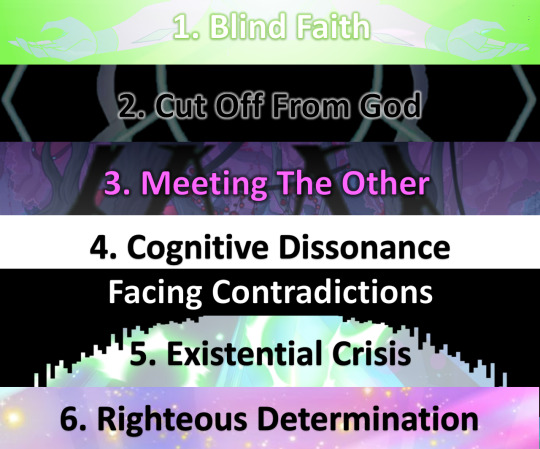
Multiple major characters' arcs in She-Ra begin with rethinking their loyalty to The Horde. Wrong Hordak and Adora both lose their faith in The Horde after a lifetime of indoctrination into its ideals and goals. Their journey away from The Horde mirrors many young Americans' away from Christianity, with at least one notable exception: time. Deconversion takes multiple years for most ex-Christians, but only takes a few days for Adora and Wrong Hordak. Their de-conversion basically represents a speed run of most ex-Christians'.
Full Breakdown of Each Stage
(tw: mention of depression and suicidal ideation)
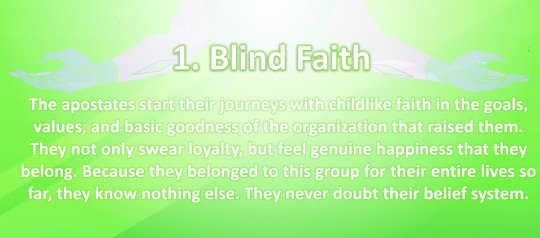
Adora takes delight in pretending to beat up an imaginary princess in the show's first scene, and later calls princesses "violent instigators who don't even know how to control their powers." She believes in the ideals of The Horde, and feels excited to rise through the ranks to become Force Captain. Obedience to Horde authorities comes fairly naturally to her, and she even chides Catra for being "disrespectful."
Wrong Hordak consistently repeats his loyalty to Horde Prime throughout his first episode and beyond. Even while being attacked by his fellow clones, Wrong Hordak affirms that "We serve Horde Prime's will." Unprompted in the next episode he happily announces, "I believe in Horde Prime!"
I felt proud, as a kid in Sunday School, that I could answer more questions about the Bible than any of the other kids. My church's youth group was the most enjoyable part of my middle school years especially because I got to hang out with the guy I only recently realized I'd had a huge gay crush on. I started viewing "feeling happy" and "feeling the presence of God" as identical. I wrote in my 2011 "Faith Statement" for my church's Confirmation that "I fell in love with God," and that "I thank God that I was born into a good Christian family and was raised to honor God."
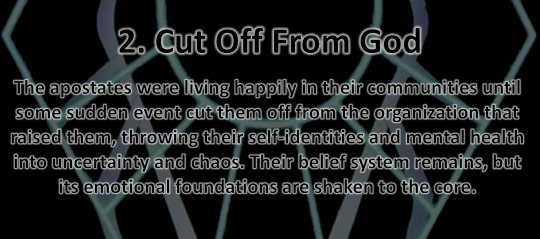
Adora is kidnapped by the Horde's enemies and taken away from her home, separated from all of the voices reassuring her that The Horde is a good organization with a just mission. Shadow Weaver is not around to give her orders or map out her future anymore, leaving her alone with her enemies and her thoughts.
Wrong Hordak's connection to the hive-mind he knew for all of his life is severed. "I am…alone?" he asks in shock, then breaks down and cries, "I am alone!" For someone who grew up living in the same mind as his entire communal "family," suddenly losing that connection to everyone he knew would be traumatizingly shocking. The best equivalent I can think of in human experience is being suddenly ripped away from your family and community and then never seeing them again.
I kept conflating happiness with my faith in God for years, even after my crush moving away drove me into suicidal ideation for a couple weeks in 2011. My mental health recovered for a year before settling into a long-term depression in 2012. Because I conflated happiness with the presence of God, my depression felt like something had taken away the presence of God.

Adora defends the organization that raised her by quoting her highest authority: "Hordak says we're doing what's best for Etheria. We're trying to make things better. More orderly." Glimmer argues against Adora's worldview by showing her (1) that princesses are just people instead of dangerous violent monsters, and (2) what The Horde has done: first the ruins of a village destroyed by The Horde, and then that the village of Thaymor which she was told to attack was peaceful, innocent, and happy.
Wrong Hordak grabs Entrapta by the hair for the crime of "trespassing," and enjoys saying, "Prime shall hear of this, and his punishment shall be merciless." But once Bow’s arrow disconnects him from the Horde’s hivemind, he is simultaneously stranded away from the people who constantly reinforced his belief in Horde Prime’s goodness and stuck with a group of people opposing Prime. For a long time, Wrong Hordak simply pretends that the Best Friend Squad™ serve Horde Prime just like everyone else he ever knew. Every line of his dialogue in “Taking Control” is a quick, snappy motto he took from Horde propaganda, like “I believe…in Horde Prime” and “True nourishment comes from the favor of Horde Prime.” [see footnote 1]
I was well aware, growing up in a progressive suburb, that plenty of my high school friends were nonreligious. After my depression sunk in, I found myself arguing about religion with a brilliant but very smug British friend who consistently refuted my arguments in ways I could not dispute. Searching for arguments to support my pre-existing beliefs, I started reading Christian apologetics, but found nothing my friends could not easily refute. [see footnote 2]
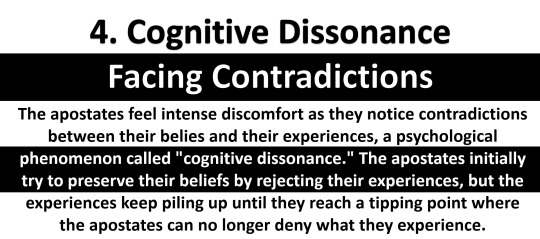
Adora sees the ruins of the site of a Horde attack while with Glimmer and Bow, and at first rejects what Glimmer tells her about what she sees to preserve her worldview: "This doesn't make any sense. The Horde would never do something like this…You don't know them like I do." But when she sees The Horde attack Thaymor, the belief system painstakingly constructed by The Horde and drilled into her over 15 (or so) years comes crashing down. At first she can rationalize away her experiences to preserve her beliefs, but when the evidence of her own senses becomes overwhelming she cannot resolve the cognitive dissonance between her belief in The Horde's goodness and her direct experience of The Horde attacking the innocent town of Thaymor. Her worldview cannot explain what she experienced.
Wrong Hordak keeps his belief in Horde Prime's all-powerful nature for a long time after joining the Best Friend Squad. However, when until the Best Friend Squad catches him in a contradiction. He tells them what he was told: that Krytis does not exist. As soon as they start questioning the contradiction he was fed, he becomes extremely uncomfortable. He maintains his denial of Krytis' existence even after they land on the planet, until he can no longer deny the evidence that Horde Prime is not all-powerful.
I grew up, like many of you, on the Internet. My depression began during the heyday of the online atheist movement—and by “heyday,” I mean “seemingly inescapable presence,” especially on YouTube where I hung out. I kept running into comments asking questions that I could not answer: Why does Christianity seem to promote belief based on internal feelings instead of observable evidence? Why would an all-loving god send anyone to hell forever? Why did I believe claims from Christian doctrine and doubt claims from every other religion? Why has Christianity seemed to cling to the past instead of embracing a progressive future? The questions overwhelmed me. I found myself terrified of my own growing doubts. Eventually, my belief was based entirely on two emotions: nostalgia for past happy experiences I associated with Christianity, and a fear of losing the vague hope those experiences gave me.
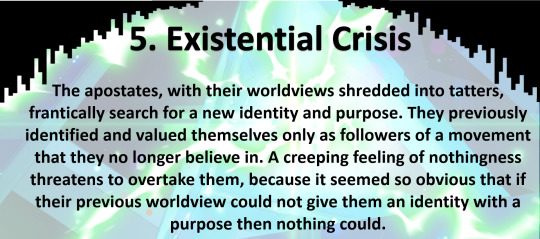
The first time that Bow and Glimmer met Adora, they immediately labeled her “Horde soldier!,” and the label stuck through the first three episodes. Adora has always identified herself primarily as a soldier serving The Horde, echoing the messages she has heard for her whole life: “Shadow Weaver said it didn't matter who I was before, that—that I was nothing before Hordak took me in.” The language of “I was nothing” reflects cult dynamics where a group tries to retain someone permanently by making them think of themself as nothing more than their worshipful loyalty to the group. Similarly, it is a common Christian belief that “without Jesus we are nothing.”
After realizing that Horde Prime fes him lies, Wrong Hordak collapsed into a sobbing mess. “Who am I if not an exalted brother of Prime?,” he bawled, still thinking that the only legitimate kind of identity is one based on fully devoted worship of an all-powerful authority. Per Entrapta, “It seem[ed] that Wrong Hordak has begun to question the meaning of life.” She later described Wrong Hordak’s breakdown as an “existential crisis,” which happens “when individuals question whether their lives have meaning, purpose, or value, and are negatively impacted by the contemplation.” Without an all-powerful father figure to value him, Wrong Hordak thought, who would?
I identified myself fundamentally as a Christian for my entire childhood and teen years. I found joy, purpose, and a sense of self in my religion. Leaving my religion behind felt like burning the bridge to who I was behind me. When I de-converted from Christianity, I felt like I was standing at the brink of a void. I thought that without finding goodness in God, I might find no goodness at all. [see footnote 3]
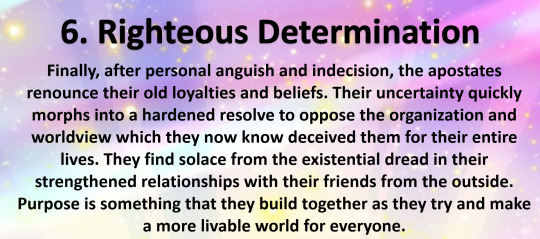
When Wrong Hordak finishes (digitally, but also emotionally) processing the Krytis data logs of Horde Prime leaving in defeat, he explicitly renounces his old loyalties and declares his opposition to the organization and beliefs that he used to believe in with all his heart: "Brothers! Horde Prime lied to us. He is a false ruler. We must rise up against him, and free the universe from his unjust reign!"
After Adora betrays the Horde at the Battle of Thaymor, she pledges her loyalty to Bright Moon in her battle against the Horde: "I’ve seen for myself the atrocities the Horde has committed against the people of Etheria, and I’m ready to fight to stop them. If you give me the chance, I know I can help the Rebellion turn the tide of the war."
I didn't have an explicit declaration statement like Wrong Hordak or Adora. However, on 5/5/15 I arranged a meeting with my very friendly and understanding youth pastor as a last-ditch effort to save my faith. I hoped that he would crush my worrying doubts. Instead, actually encouraged me to become agnostic and to look into non-Christian beliefs on the subject of religion. Rather than feeling terrified of what I might find and wishing that someone could indoctrinate me into my old belief system, I started on a path to discover the truth wherever it might lead me.
Footnotes for Context
Christian fundamentalists’ similarly simplistic snappy phrases have been labeled by ex-Christians as “thought-terminating clichés… brief, highly reductive, definitive-sounding phrases” where “Simple labels are attached to something you like or dislike, and they are the start and finish of all thought on the subject.” Such black-and-white “totalistic” thinking is common in Christian fundamentalism, especially how it labels complex political topics as somehow being merely a cover for “spiritual warfare” between the totally good/Godly side and the totally evil/demonic side.
Specifically, I started reading an “Intelligent Design” propaganda apologetics book by Lee Strobel called The Case For A Creator. A self-proclaimed former atheist, Strobel wrote his The Case For series using my same research strategy: Only do research using sources that already agree with you. Whereas Strobel exclusively talked to other Christian apologists, though, I at least tried talking to atheists. Anyway, I walked into school one day with a confident smile and a copy of Strobel’s book and sat down with some friends. One of them, another brilliant atheist but with a far subtler and humbler personality, noticed it and his face immediately sunk into the expression of someone exhausted by the topic as he braced himself for my bullshit. When I confidently asserted a creationist talking point trying to dismiss the findings of some old experiment, he not only knew the experiment but immediately dismantled my talking point. I had no reply. What struck me most was not just his swift rebuttal, but his weary tone: My arguments were not only bad, but so bad that he was genuinely tired of them.
Around the same time, I became obsessed with the character of Kefka from Final Fantasy 6. To me, Kefka represented what I feared most about leaving Christianity behind — that I would lose any sense of meaning, purpose, or morality in my life. ("Life… Dreams… Hope…Where do they come from? And where are they headed? Such meaningless things!") Edgy, I know, but in my mind that kind of absurdism seemed to be an inevitable result of abandoning my religious beliefs. Fortunately, I came to understand that there is plenty of meaning, purpose, beauty, and goodness outside of the particular religion that I happened to be born into.
#she-ra#spop#she-ra spoilers#spop spoilers#religion#christianity#long post#...#about me#religious meta
37 notes
·
View notes
Note
I wasn’t the biggest fan of how the MCU treated steve Rogers character - but since the MCU was also the reason I became a Steve/cap fan, I really wish they would have given him a Steve Disney plus series, maybe like dug days (UP), where it’s just a short of of what his life was liek after he woke up from the ice. I would have loved to see marvel explore Steve as a person, NOT as cap or revolving around the other characters (no offense to Bucky fans but like…I’m sick of him). Just Steve as him.
i think the dissonance between steve as Steve versus steve as Captain Rogers/Captain America is so funny sometimes because of how many people actually fall for the persona despite the fact that we see it being created as literal propaganda. like, i’m not saying captain america never became more than that— the men behind it like steve and sam are what give it heart— but at the end of the day, it’s just a name. it’s an IDEA. it isn’t real so much as idealistic. people who don’t actually pay attention to steve will accept his Patriotic Persona at face value when in actually, he’s almost nothing like that in his personal life? he’s a good man with a big heart who will always want to help people but he isn’t this domineering, military loving, larger than life macho guy who fucks chorus girls every night. he’s just… steve. he likes reading in his spare time (as shown by his bootcamp suitcase and tws apartment shelves). he sketches when he’s nervous. he starts fights sometimes, but more often than not, he’ll end up apologizing if he doesn’t think he was right. he always checks in on his friends and makes sure they’re okay but he also cries when he’s upset, even if he tries to hide it. he’s human, and i think too many people forget that because the mcu failed to show it (thanks a lot, deleted scenes).
anyways. steve is just a dude. a little guy. a normal person. if you fall for the captain america persona his propaganda films were pushing, youre missing the point of his character.
#this is why when steve stans say they want steve back people act like they’re automatically trying to put sam down#even tho SAM is captain america now and steve stans know that … most of them just want steve as plain steve back#which i have mixed feelings on bc i will only accept him if hes young and not joe bidens twin#but a series of him during the year btwn tfa and av 2012 ☹️#or a nomad series w sam and natasha on the run#or a retirement series when#steve rogers home cooking show!
11 notes
·
View notes
Note
what beef do you have with queenjanai, if you don’t mind me asking further?
under a read more so ppl can avoid it if they want. tw for mentions of harassment and bullying
basically this, in addition to the anger they displayed at me when i privately tried to explain that i’m not on twitter and didn’t know what they were talking about, nor is shipping (that’s the lesbophobia bit) ever a reason to bully and harass people.
however, i’ve never been someone to take the most issue with how someone treats me, but honestly: if someone’s default reaction to a perceived slight in fandom is to be super aggressive, that’s a warning sign to me.
other behaviour that was worrying: not condemning the way j*naya shippers were harassing / bullying / sending death threats to grenmaya shippers in addition making posts that added to or encouraged the harassment; spreading misinformation about the cast and crew of tdp (especially devon, tdp’s head writer) and pushing the narrative of pitting queer women against each other; harassing some members of the cast and crew / encouraging harassment; testimony from other shippers of gatekeeping content and some pretty petty drama; viewing fandom as a sort of hierarchy and getting upset that i was trying to “paint a picture of her” to “my followers” as though this isn’t a trashcan on tumblr (and again, somehow that what she had reblogged to her followers didn’t count by her own logic as painting a negative picture of me bc cognitive dissonance, i guess - like i truly do not care but at least have logic); belonging to the anti shipping movement which has puritanical conservative values at its core + contributes to aphobic rhetoric.
the anti shipping movement also has no problems with harassment because “[insert group here] are freaks who deserve it unless they give me, a stranger on the internet, proof of [insert trauma / identity / age / super fucking personal info here] and if they’re Enough not that thing Per My Standard then they’re a [insert derogatory term here].” shocking, i know
aka all this and more. i know newer people coming into fandom might not be aware of these sorts of things, and while this is of course only my biased accounts, if these are things other people have seen or experienced - or things they want to avoid; or for some people, the sort of fandom experience they are for some reason looking for - this might be a good heads up
#anyways as always here's hoping people became happier healthier individuals#myself included tbh we can always use some self improvement#thanks for asking#ace people who contribute to their own experience of aphobia are wild#fandom nonsense#queenjanai#it's my two days a year to have drama#i'm not on twitter and it shows lmao#i'll never understand why people add their things onto my posts#Anonymous#like if you ever think real people deserve harassment put downs or any sort of bullying over FICTIONAL CHARACTERS#ding dong you are wrong
18 notes
·
View notes
Text
FIVE SONGS
list five songs associated with your muse and its meaning to them as a character, or to you as the writer. this can be applied in-character or out-of-character. it can go as deep as looking at the song’s real-world origins or meaning along with the themes it carries to the muses’ story, values, or experiences, or as simple as if your muse would listen to this kind of music, or even if you just listen to these pieces for inspiration.
TAGGED BY: @handspoken (i think this is my first time actually being tagged in one of these! thanks!) TAGGING: @dogandroses (any muse you like!), @puzzlebones, @the-judge-of-bones, @sxvethequeen, @ladydreemurr, @staydetermined, @nebula-gaster, and anyone else who wants to do it!
01. Megalo Strike Back - Toby Fox
a part of the soundtrack from earthbound, a game toby fox worked on a few years before undertale’s release. though it’s not connected to undertale explicitly, the link with megalovania has led to some headcanons of it being chara’s theme. i was a little hesitant to include this, it felt like a bit of a cliche, but ultimately I do like it as a theme for chara. you’ve got the rich, heavy instruments that remind me of megalovania and other intense battle themes, but with a bright, simple melody more reminiscent of flowey’s theme and the image of something happy and childlike turned bad.
02. Requiem - Dear Evan Hansen (tw: suicide mention) when the villains fall, the kingdoms never weep / no one lights a candle to remember / no, no one mourns at all / when they lay them down to sleep
not as much a song that could be from chara’s perspective, as the later ones on the list are, but more a song about their impact. the song deals with a family, reacting in different ways after a member commits suicide unexpectedly. it’s not a stretch to see them as the dreemurrs. their sibling is coming to terms with the fact that the person who died was a flawed person who hurt them, and struggles to grieve as they’re expected to. the father feels bitter, regretting that he wasn’t able to provide enough for his child, while the mother remains hopeful that some essence of her child remains in the world. the idea of remembrance - the “requiem” - links in to chara’s bitterness towards the monsters after death, that they literally sacrificed themselves to make a difference to monsterkind and barely see anyone remember that, while frisk gets all the glory and credit.
03. Everyone Else is an Asshole - Reel Big Fish everybody else thinks of no one but themselves / and no one wants to help cause they're all assholes / and every friendly chat is a knife in the back / a sneaky attack waiting to happen
this is probably the least serious song on the list, but it’s still an interesting look inside their head. the singer here insists that the rest of the world are assholes, that he’s the nice guy, and his worries about what they’re going to do to him drives him to physical violence. while chara fully acknowledges that they play the villain in bad runs, and often enjoy it, i think this song applies to the overall dissonance between their mindset and the actual reality of the world. they have a habit of separating things into black and white, good and bad, despite any evidence that it isnt the case. they believe caring about another person, even just being allies with someone else, is a stupid, unnecessary risk that will only lead to them getting betrayed. this defensiveness, this refusal to connect with others, is a big driving factor in chara getting physically violent towards the people around them.
04. Monster - Dodie Clark i'm guessing that i've grown horns / i guess i'm human no more / i can tell I've rotted in your brain
it’s not a song chara would ever listen to themselves, but i’m always a sucker for a good monster/human metaphor i can apply a little too literally. though it’s originally written about romantic partners, the core idea of two people who used to love each other, and now begin to hate each other, feels very relevant to chara’s life. mix that in with the visuals of hate slowly turning a person into something grotesque and monstrous, and you get an interesting clash of ideas - chara’s rejection of humanity and their wish to be more like their monster family, and chara’s mindset that they are inherently twisted and dark and evil in some way. it also explores the idea of regretting the past, wanting to take it back but being unable to do that or even to communicate how you really feel, and that resonates very strongly with my portrayal of chara.
05. Blasphemy - Bring Me The Horizon you got hell to pay, but you already sold your soul / it's blasphemy, but the words don't make sense no more / what would your mother say?
i’ll be real here, when i first looked through this meme, i was acutely aware that my interests in music are very different to chara’s, and it felt like a disservice to not include at least one song that they’d actually listen to. so after a chat with a friend who has more similar tastes to them, i picked out this. the creators describe it as being about people who make themselves believe something they know deep down is false, because the alternative scares them. looking to what ive mentioned already about chara’s binary, reductive mindset that enables them hurting others, it feels very relevant. throw in some religious imagery, linking to the whole “angel of death” concept in undertale, and the concept of sacrificing yourself for an already flawed belief, and i knew it had to be on here.
#look at what you’ve done (meme)#disconnected. (ooc)#((im sorry in advance for any whiplash in listening to these#ive had chara as a muse for a while and the music i listen to changes a lot over time#hopefully ive got a nice coverage though#definitely a fun one to do!! so thanks for tagging me!!))
1 note
·
View note